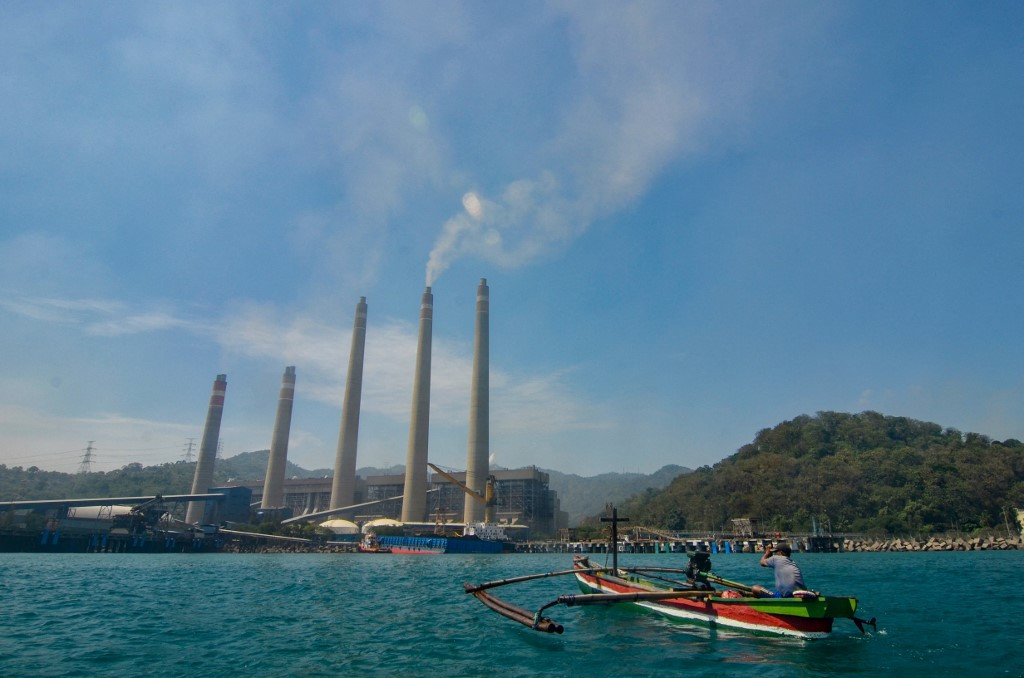Indonesia’s ‘coal hard facts’
Indonesia could move the date forward to 2040 if it can raise up to US$40 billion needed to convert these coal plants into using renewable energy resources.
Change text size
Gift Premium Articles
to Anyone
 Fishermen sit on their boat as smoke rises from chimneys at the Suralaya coal power plant in Cilegon, Banten on Sept. 22. (AFP/Ronald Siagian)
Fishermen sit on their boat as smoke rises from chimneys at the Suralaya coal power plant in Cilegon, Banten on Sept. 22. (AFP/Ronald Siagian)
M
any decades from now when the Earth is so much hotter than today, many people in Indonesia and around the world will look back and wonder why countries failed to stem the use of coal, knowing perfectly well that it would accelerate global warming with dire consequences for the environment.
They will find stories of how world leaders at their meeting in the United Kingdom city of Glasgow in November 2021 discussing climate change only pledged to phase down, instead of to completely phase out, coal. They will learn that developing countries, led by China and India, decided that coal was irreplaceable as a source of energy to fuel their economy and to lift millions of their people out of poverty.
India led the campaign at the United Nations Climate Change Conference (COP26) in Glasgow to water down a deal proposed by many other countries to push for a 2030 deadline to phase out coal. Most scientists agree this is what is needed to curb the rise in global temperature to 1.5 degrees Celsius, the maximum tolerable level to prevent catastrophic environmental destruction.
India says it still needs to use cheap coal to fuel economic growth. China pledges its coal use will peak up until 2030. Indonesia, which burns its coal as well as exports some, including to China and India, has made a concession on its commitment when to end it all, albeit with a qualification.
Currently, Indonesia plans to end the use of coal by 2056, which is essentially when the last of its existing coal-fired power plants, and many more that are still coming online in the next few years, will retire. Finance Minister Sri Mulyani says Indonesia could move the date forward to 2040 if it can raise up to US$40 billion needed to convert these coal plants into using renewable energy resources.
Where is the money going to come from? The Asian Development Bank, which is helping Indonesia craft the coal exit strategy, will finance some of it. But the bulk of the money will have to come from developed countries.
That is a big “if” going by Glasgow, where these countries fell short of making the financial commitments of $100 billion by 2020 needed to help developing countries fight global warming. In fact, the move toward net-zero emissions of greenhouse gases by 2050 hinges on financing from rich countries, which are largely responsible for the current state of the climate deterioration.
Indonesia will find it particularly difficult to kick its coal addiction. Coal is very much part of its energy security strategy, fuelling more than one third of all its power plants. Current high prices of coal in the world market mean that its export is bringing in the dollars to help the economic revival after the pandemic-induced recession. As other countries phase out coal, including China after 2030, Indonesia will be left with a huge surplus that it will have to burn itself.
Besides, Environment and Forestry Minister Siti Nurbaya Bakar stated last week that President Joko “Jokowi” Widodo’s massive economic development program must not be stopped in the name of zero carbon emission and zero deforestation.
Decades from now, when Indonesia feels the brunt of global warming, many of us will look back and ask, has it been worth it?









